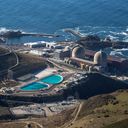Nuclear power is having a resurgence

Twin energy and climate crises are forcing governments around the world to take a fresh look at nuclear power.
Why it matters: Pressure on politicians to find reliable, low-carbon power supplies has them reconsidering the long-standing stigma surrounding nuclear plants.
State of play: For now, that means rethinking already-planned retirements of nuclear reactors.
- In California, the legislature is now considering a new bill to extend the life of the state's last nuclear plant, which is currently slated to be completely shut down by 2025.
- Germany, which was set to shutter its remaining nuclear plants by the end of the year, is now debating whether to keep some open as it faces energy shortages due to plunging Russian natural gas imports.
- And in energy-poor Japan, the prime minister has called for the reopening of idled nuclear reactors, and a broader policy shift toward nuclear — for the first time since the 2011 Fukushima nuclear disaster.
The backstory: The golden age of nuclear power plants was the 1970s, when surging prices for oil and coal — natural gas wasn't in wide use at the time — and strong economic growth set off a boom in construction.
- By 1974, for example, the U.S. Atomic Energy Commission forecast that nuclear power would produce half the country's energy by the end of the century. (It's been roughly 20% since 1990.)
- Instead, nuclear power plant construction plunged, as environmental and safety concerns grew — especially after the high-profile accident at Pennsylvania's Three Mile Island plant in 1979.
The big picture: Now, the sharp increase in electricity costs are wreaking havoc on global markets — making the notion of taking any plant offline unthinkable.
- Case in point: In the U.S., the recently passed Inflation Reduction Act provided a subsidy known as "production tax credits" to existing nuclear plants for the first time, as an incentive to keep them in operation.
Yes, but: Though governments are less willing to phase out existing nuclear plants, don't expect a surge in construction of new ones, analysts say.
- There are worries about safety and nuclear waste disposal, and political headaches around selecting a site and building the plants.
- Also: They're incredibly expensive.
What they're saying: "Nuclear power plants are some of the biggest and most complicated facilities that mankind builds," says Lucas Davis, economist at the University of California, Berkeley's Haas School of Business, who has studied the economics of nuclear power.
- "Construction costs continue to be so high, it makes the nuclear renaissance unlikely," he adds.